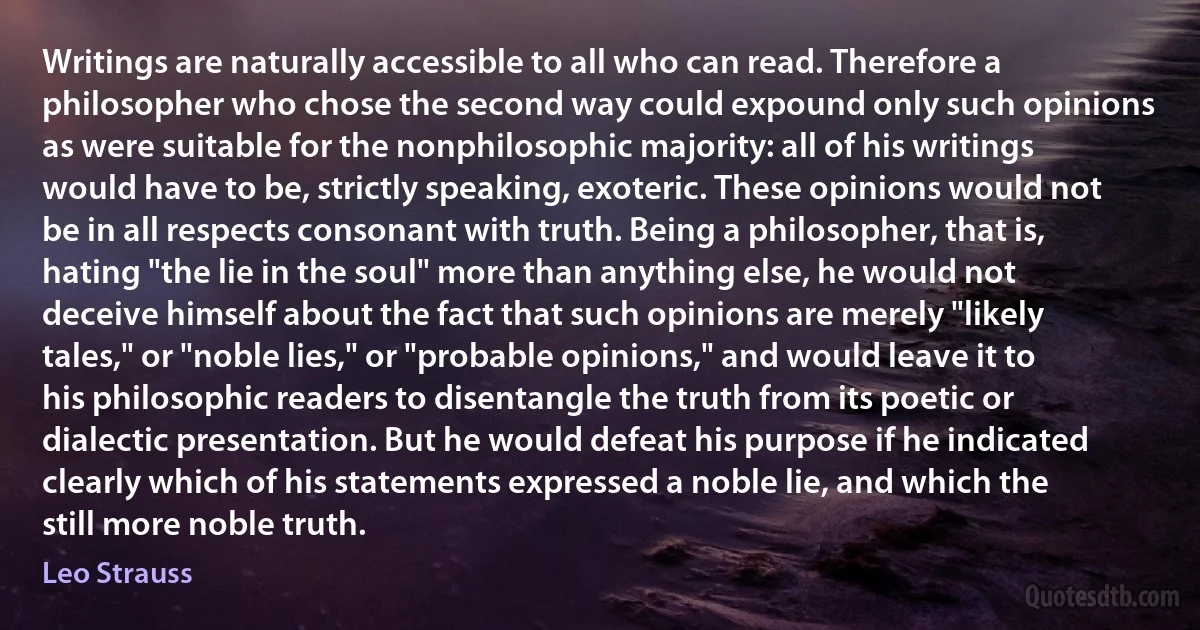
Writings are naturally accessible to all who can read. Therefore a philosopher who chose the second way could expound only such opinions as were suitable for the nonphilosophic majority: all of his writings would have to be, strictly speaking, exoteric. These opinions would not be in all respects consonant with truth. Being a philosopher, that is, hating "the lie in the soul" more than anything else, he would not deceive himself about the fact that such opinions are merely "likely tales," or "noble lies," or "probable opinions," and would leave it to his philosophic readers to disentangle the truth from its poetic or dialectic presentation. But he would defeat his purpose if he indicated clearly which of his statements expressed a noble lie, and which the still more noble truth.
Leo StraussRelated topics
anything chose consonant defeat dialectic leave lie likely noble presentation purpose read second soul speaking tales truth way liesRelated quotes
The animating purpose of James was, on the other hand, primarily moral and artistic. It is expressed in his phrase, "block universe," employed as a term of adverse criticism. Mechanism and idealism were abhorrent to him because they both hold to a closed universe in which there is no room for novelty and adventure. Both sacrifice individuality and all the values, moral and aesthetic, which hang upon individuality; for according to absolute idealism, as to mechanistic materialism, the individual is simply a part determined by the whole of which he is a part. Only a philosophy of pluralism, of genuine indetermination, and of change which is real and intrinsic gives significance to individuality. It alone justifies struggle in creative activity and gives opportunity for the emergence of the genuinely new.

John Dewey
The Philosopher of this age is not a Socrates, a Plato, a Hooker, or Taylor, who inculcates on men the necessity and infinite worth of moral goodness, the great truth that our happiness depends on the mind which is within us, and not on the circumstances which are without us; but a Smith, a De Lolme, a Bentham, who chiefly inculcates the reverse of this,-that our happiness depends entirely on external circumstances; nay, that the strength and dignity of the mind within us is itself the creature and consequence of these. Were the laws, the government, in good order, all were well with us; the rest would care for itself! Dissentients from this opinion, expressed or implied, are now rarely to be met with; widely and angrily as men differ in its application, the principle is admitted by all.

Thomas Carlyle
It is still necessary to suppress the bourgeoisie and crush its resistance. This was particularly necessary for the Commune; and one of the reasons for its defeat was that it did not do this with sufficient determination. But the organ of suppression is now the majority of the population, and not the minority, as was always the case under slavery, serfdom and wage-slavery. And since the majority of the of the people itself suppresses its oppressors, a "special force" for suppression is no longer necessary. in this sense the state begins to wither away. Instead of the special institutions of a privileged minority.. the majority can directly fulfill all these functions, and the more the functions of state power devolve upon the people generally, the less need is there for the existence of this power.

Vladimir Lenin
Identical in the physical processes by which he originates-identical in the early stages of his formation-identical in the mode of his nutrition before and after birth, with the animals which lie immediately below him in the scale-Man, if his adult and perfect structure be compared with theirs, exhibits, as might be expected, a marvellous likeness of organization. He resembles them as they resemble one another-he differs from them as they differ from one another.-And, though these differences and resemblances cannot be weighed and measured, their value may be readily estimated; the scale or standard of judgment, touching that value, being afforded and expressed by the system of classification of animals now current among zoologists.

Thomas Henry Huxley
For what advantage is it, that the world enjoys profound peace, if thou art at war with thyself? This then is the peace we should keep. If we have it, nothing from without will be able to harm us. And to this end the public peace contributes no little: whence it is said, ‘That we may lead a quiet and peaceable life.' But if any one is disturbed when there is quiet, he is a miserable creature. Seest thou that He speaks of this peace which I call the third (inner, ed.) kind? Therefore when he has said, ‘that we may lead a quiet and peaceable life,' he does not stop there, but adds ‘in all godliness and honesty.' But we cannot live in godliness and honesty, unless that peace be established. For when curious reasonings disturb our faith, what peace is there? or when spirits of uncleanness, what peace is there?

John Chrysostom
